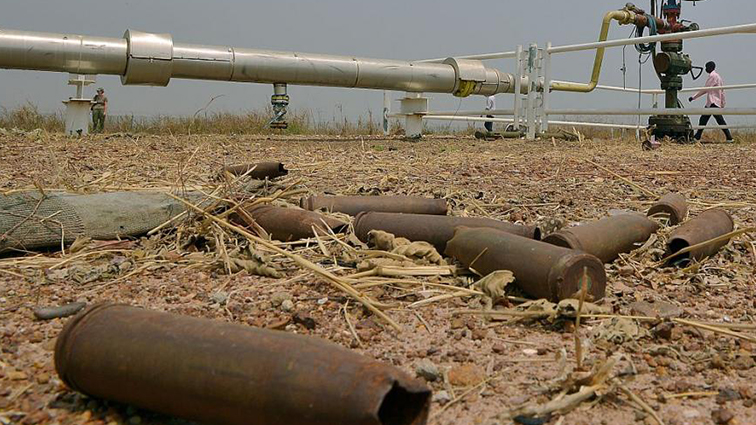Sudan’s oil pipeline |File Photo|
South Sudan and Sudan reached an agreement to resume the export of South Sudan’s heavy sweet Dar Blend crude oil grade within six to eight weeks as the engineers kick-start the repairing of pipelines damaged by the ongoing civil war in Sudan.
The landlocked South Sudan depends on Sudan’s oil pipeline to export its crude oil to the international market through Port Sudan.
The breakthrough was announced to the media by the Deputy Chairperson of Sudan Sovereign Council Malik Agar on Thursday 25 April 2024.
Agar, who is the Commander-in-Chief of the SPLA-N armed movement, and also Sudan’s vice president, expressed his country’s keen interest in restoring the oil pipeline in the interest of two sisterly nations, Sudan News Agency reported.
Information Minister, Michael Makuei Lueth in February this year announced that the glitches in the pipeline coupled with Yemen’s Houthis Red Sea blockade crippled South Sudan’s economy.
South Sudan completely depends on oil sales for more than 90 percent of government revenues.
Makuei said the pipeline has suffered petroleum gelling and leaks, forcing the government to shut down the crude oil pumping until the issue is resolved.
Finance and Planning Minister, Awow Daniel Chuang also confirmed to the media that, the repairing work of the pipeline was progressing well despite logistical challenges, and that unless something unforeseen happened, flows “should resume” within six to eight weeks.
However, the fighting between the Rapid Support Forces and Sudan Armed Forces frustrated the repairing work as the two warring parties extended their battleground close to the oil pipelines.
How Sudan Owns Oil Pipeline
In September 2012, Sudan and South Sudan signed nine cooperation agreements, including a framework agreement and specific agreements on oil, border issues, citizenship, and the division of debts and assets.
These represented many of the unresolved issues stemming from the secession of South Sudan in July 2011.
The secession of South Sudan necessitated an agreement on how to deal with the assets and liabilities of what was previously one state. The two states adopted a comprehensive approach to the treatment of assets and liabilities, arrears and claims.
The deal gives Sudan ownership of the pipelines. The world’s youngest nation, South Sudan, agreed to pay a pipeline transit fee of $9.48 per oil barrel to transport its crude through Sudan
With the splitting of the two countries in 2011, most of the oil-producing blocks are located in South Sudan—about 70 per cent of the deposits. Sudan owns the pipeline and South Sudan the oil.
Impact of oil halt on South Sudan
South Sudan’s economy suffered a major blow as the inflation rate hit the highest record following the stoppage of oil production and exports.
The rate of local currency, the South Sudanese Pound, depreciates against the US dollar, hitting 2,500 South Sudanese pounds against 1 US dollar in the parallel market; the shoot up the commodity prices by 10-fold as well as incapacitates the government to pay the civil servants for more than seven years due to lack of funds.
Sudan loses the transit fee of $9.48 per oil barrel, an amount used to finance government expenditures among others.
In late January this year, the leaked United Nations Panel of Experts report tracked the movement of fuel trucks from the capital Juba to Wau, the northwestern city and capital of Western Bahr el Ghazal State.
According to the report, the fuel was transported to RSF-controlled areas in South Darfur State through Raja and Kafia-Kingi, the government of South Sudan rejected the claims.
Golden Times | South Sudan




